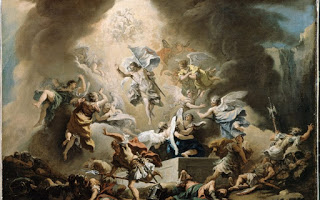 Feasts of Feasts
Feasts of Feasts
While it has always been understood, theologically, that Easter—the Resurrection of the Lord—is the greatest feast of the Church, more attention has actually been given to Christmas. Christmas seems to have been made for children. Let’s be honest, most of us grownups love it too! Eventually the discovery by the child as he grows up, that Christmas was not the feast-of-feasts comes as a shock, and met with disbelief; but it is true nevertheless. I guess this is more shocking than discovering that the gifts you received every Christmas wasn’t brought by Santa.
Saint Paul tells us that “if the dead are not raised, then Christ has not been raised. If Christ has not been raised, your faith is futile and you are still in your sins” (1 Cor 15:16-17). Strong words but Saint Paul’s statement is undoubtedly true. Without our faith built on the solid foundation of the Resurrection, it would merely be a house of cards, tittering on the brink of collapse and destruction. For who needs another religion with good ideas and concrete advice for moral living. Any self-help book from your local bookstore can do the job.
But our Lord’s Resurrection is the sine qua non of Christianity, it is absolutely necessary. A Christianity without belief in the Resurrection would no longer be Christian. Essentially, if it were not for the resurrection, all the other things that our Lord did and said, including His birth, would not be efficacious for our salvation. Hence, all events lead up to, all our beliefs revolves around, and all things can be traced back to His rising from the dead.
The same could be said about tonight’s liturgy which is described as the Mother of all Vigils. What we celebrate and how we celebrate tonight’s liturgy has great bearing on our faith and vice versa. The Catechism of the Catholic Church tells us that belief and liturgy are tied up together: “When the Church celebrates the sacraments, (and, here, the Easter liturgy is particularly important) she confesses the faith received from the apostles—whence the ancient saying: lex orandi, lex credendi. The law of prayer is the law of faith: the Church believes as she prays. Liturgy is a constitutive element of the holy and living Tradition” (Catechism of the Catholic Church §1124). This teaching is forcibly illustrated in the liturgy of the Easter Vigil, the climax of the Paschal Triduum, the Christian Passover. Tonight, we witness how our Christian faith is beautifully mirrored and expounded in our liturgy.
But first the context. The Passover was so central to the religion of the Jews because it represented the deliverance of the Israelites from slavery in Egypt, as well as the beginning of their formation into the People of God. Now, because of the resurrection, we Christians through our baptism which is a sharing in our Lord’s death and resurrection, are formed into the people of God’s Son. This resurrection is the true Paschal festival, at once, final and forever. We are now delivered from a much greater evil than Egyptian slavery. At least the slave’s suffering comes to an end in the death of the slave. But we are now enslaved to something far worse than the Egyptians - we are enslaved to sin, and unless it is compensated for, and then repented of, would lead to a slavery that would last forever, even after death!
But the good news that rings out through every part of tonight’s liturgy is what Saint Paul declares in the second reading and this is what we will witness at the baptism of the candidates arrayed before us: “When we were baptised in Christ Jesus we were baptised in his death; in other words, when we were baptised we went into the tomb with him and joined him in death, so that as Christ was raised from the dead by the Father’s glory, we too might live a new life.” Saint Paul is saying that our Lord’s resurrection is not just an event which solely affected Him but one which has affected the entire Church and her members, those of us who are baptised in His name.
Tonight we reaffirm our ancient faith, the faith proclaimed by Saint Paul in his epistle: “If in union with Christ we have imitated his death, we shall also imitate him in his resurrection.” Christ has robbed death of its ultimate sting. Though none of us are immune to death, none of us can stay and hold back the ravages of time and ageing, none of us can completely insulate or vaccinate ourselves from every disease or pandemic, we know this to be true: Death has no power over us anymore, because when a person dies to sin in his baptism, “his life now is life with God; and in that way, you too must consider yourselves to be dead to sin but alive for God in Christ Jesus.” And this is what Saint Paul is trying to tell us. How could someone fear death, if he is already dead? But when you die in Christ, it also means that you are “alive for God in Christ Jesus,” and since God is deathless, we too share in His immortality.
This is what we see in the story of Israel set out in the readings of the Old Testament heard today. God brings light out of darkness, freedom out of slavery, posterity out of barrenness, quenching satisfying water out of thirst. The New Testament adds this crowning couplet to the list - God brings life out of death. In the Exultet, the solemn Easter proclamation the deacon or priest intones at the start of our Vigil, the Church shows us how God turned every seeming sin, failure, mistake and disaster in our favour. The resurrection, one gets the feeling from the way the Exultet is worded and sung, was so great, it overcame all the past.
Yes, we all love Christmas, no denying this. But today, we affirm that Easter is bigger than Christmas. As the Catechism teaches: “Therefore Easter is not simply one feast among others, but the ‘Feast of feasts,’ the ‘Solemnity of solemnities,’ just as the Eucharist is the ‘Sacrament of sacraments’ (the Great Sacrament). St. Athanasius calls Easter ‘the Great Sunday’ and the Eastern Churches call Holy Week ‘the Great Week.’ The mystery of the Resurrection, in which Christ crushed death, permeates with its powerful energy our old time, until all is subjected to him.” (CCC 1169)
It was at Christmas that our Saviour was born to us. It was on Good Friday that He died for us. But it is at Easter, that He broke the chains of death and rose victorious and we know that our faith is not in vain, our good works and attempts to grow in holiness is not futile, that we would not have to remain perpetual slaves to sin and victims of death. And for this reason we can acclaim at the top of our voices: “Alleluia! The Lord is Risen! He is Risen Indeed!”

